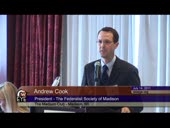Evolution and the Constitution
 Recent news reports make much of the fact that, with one exception, none of the current Republican candidates for President has been willing to embrace the theory of evolution as the commonly accepted explanation of how the multiple forms of life currently existing on our planet came to be. Instead, several of the Republican hopefuls have argued pointedly that creationism (the belief that all life was created by God in its current form) is an equally legitimate scientific theory on a par with evolution. For example, Texas Governor Rick Perry has declared that evolution is “just one theory” among several that might explain the current state of biodiversity on the earth. Former Utah Governor Jon Huntsman is the only Republican candidate willing to take a strong position supporting the theory of evolution as a scientifically proven fact.
Recent news reports make much of the fact that, with one exception, none of the current Republican candidates for President has been willing to embrace the theory of evolution as the commonly accepted explanation of how the multiple forms of life currently existing on our planet came to be. Instead, several of the Republican hopefuls have argued pointedly that creationism (the belief that all life was created by God in its current form) is an equally legitimate scientific theory on a par with evolution. For example, Texas Governor Rick Perry has declared that evolution is “just one theory” among several that might explain the current state of biodiversity on the earth. Former Utah Governor Jon Huntsman is the only Republican candidate willing to take a strong position supporting the theory of evolution as a scientifically proven fact.
According to a December, 2010 Gallup Poll, a combined 54% of Americans believe that human beings evolved from less advanced life forms, either under God’s guidance or without any participation from God. Meanwhile, 40% of Americans believe that God created human beings in their present form. The survey results also indicate that the relative percentage of Americans who believe in some form of evolution (as opposed to creationism) rises as education levels rise.
Why then, do the Republican presidential hopefuls almost uniformly reject a scientific theory that is accepted by the majority of Americans?


